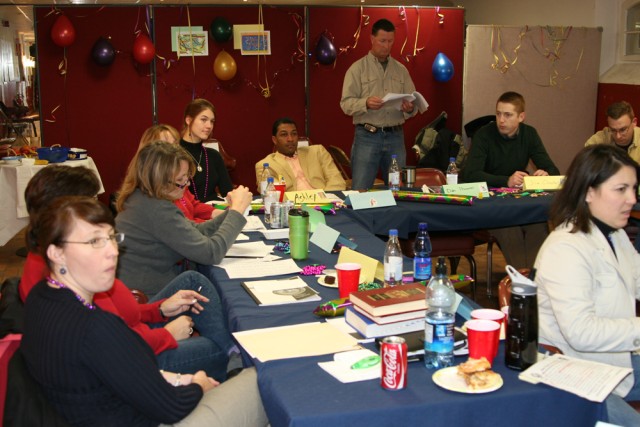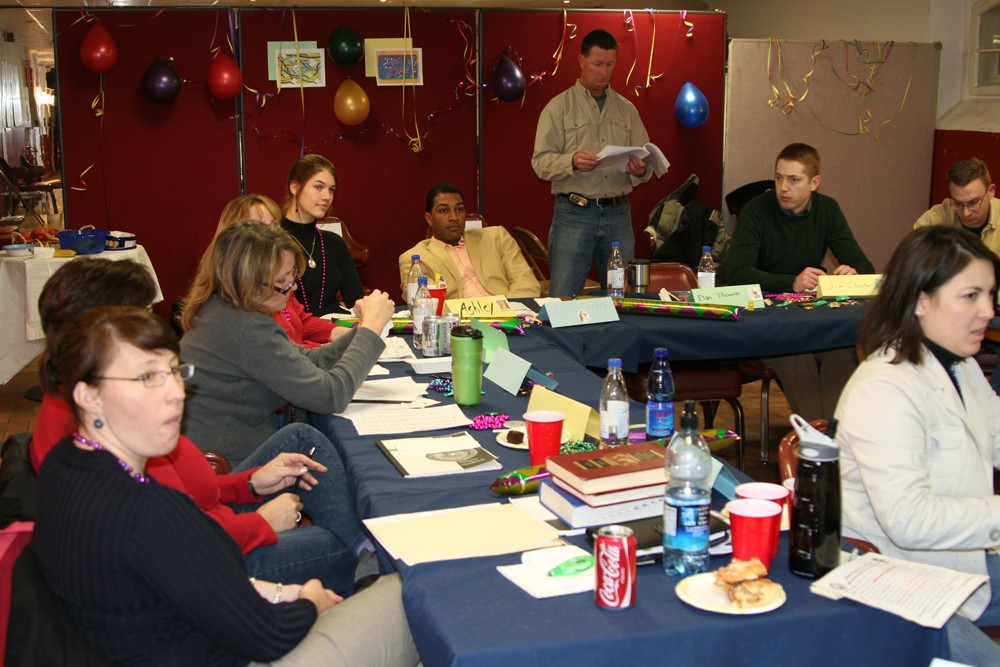ANSBACH, Germany -- "We the people...."
That is how the U.S. Constitution began almost 222 years ago and that spirit is alive and well at U.S. Army Garrison Ansbach today.
Ansbach's Army Family Action Plan delegates gathered in Katterbach to hash out 2009's community issues during the annual AFAP conference.
The top five issues to come out of the conference included:
*Require a paid English-speaking monitor on all school bus routes at all times;
*Hire a housing administrative assistant to expedite the housing process and improve productivity;
*Build a multi-purpose aquatic facility;
*Increase physical education and fine arts education for kindergarten through sixth grade students; and
*Streamline access to orthodontic care.
Even though there were more issues raised and will be worked on, these top five are the overall ones that give the command a level of engagement and what the community desires "instant results on," said Michele Schuh, local AFAP program manager.
The garrison conference consisted of five discussion groups: force support, medical and dental, youth, consumer affairs and community support services.
In each group, 10-12 delegates chose three issues to work on from their stack of issue submittal forms.
Experts in each of the five categories were available to answer questions. Finally, they discussed solutions to those issues and wrote up resolutions, said Schuh.
"AFAP in Ansbach is about change and unity," Schuh said. "For these folks, this was about the beginning of change-getting in at the ground level, making suggestions for goals to make this their Army community."
Now that the conference is over and the community has raised the issues it considers most important, Schuh said, the next step is for the issues to be assigned, worked and determined if a resolution is possible.
"We'll assign a lead agency to take each issue and begin working them," said Schuh. "And then about a month later, they will brief us on the status of the issues --the lead agency has to find a way to fix it, so we cannot say they are solved locally just yet."
She explained that when an issue moves forward to the regional or departmental level, sometimes those issues can take years -- like the physical education and fine arts for kindergarten through sixth grade.
If an Ansbach-raised issue impacts beyond the gate, it will be considered by Installation Management Command-Europe and then voted on at that level.
"If one of ours is voted on, then IMCOM-Europe will work it and hopefully we'll start to see change," Schuh said.
But most of the issues were local, she said.
"Those that did not get sent up to region only affect our garrison-like a dog park and community street lighting," said Schuh. "We are challenging the command to find ways to make these things happen--not the easy stuff."
And for Col. Christopher M. Hickey, garrison commander, making a difference for those next in line is just what he intends to achieve.
"I take their recommendations very seriously," he said. "I will track, on a regular basis at our command and staff meetings, the progress being made on these issues so we can hopefully achieve some of the changes they are recommending.
"It was very enlightening to hear some of the really intense discussions the groups had on how they view the issues from their perspective - from medical to food services, everything that affects their daily lives in our community or in the Army."
Getting that customer feedback is invaluable, Hickey said.
"It's them, and that is what the whole conference was about -- to get at their perspective," he said. "I think there will be some positive results coming out of it -- including the teens and how they see the world.
They are part of our community and we owe it to them to provide them with the best possible quality of life and services."
Customers thought their chance to voice their opinions and be a part of the solution was equally invaluable, said Isha Greene, a three-year AFAP veteran delegate spouse.
"I love the fact that we come from civilians, Soldiers, family members, teens -- it is a nice spread of effort from everyone, said Greene."It gives voice to members who would not have had it otherwise. It empowers them to be a part of the bigger picture and it does not have to be just Ansbach -- it could be Army wide or government wide.
"It gets us out of our bubble-out of our own fixed complain mode," Greene said. "It helps us be about the process and not just to talk about it-it is a huge responsibility."
She summed up the experience and process exactly how our forefathers began two centuries ago.
"It's kinda corny, but it's 'We the People....'"
Spouses were not the only ones representing the community's issues; teenagers also had a voice at the conference.
"We [teens] are part of this, too," said teenager Jessica Sowders. "It is about helping the Army Family and we are an Army Family."
The teen council worked through the issues and submitted solutions to improve the teen center, and establish better communication between the teens and the youth services staff, Sowders said.
"This way we do not just sit around and complain, we can actually do something about it-take action," she said.
Soldiers had a large say-so as well.
"I felt like we were in Congress," said Spc. Justin Shepherd, a delegate Soldier and Better Opportunities for Single Soldiers president. "We had to look at the issues and then work them--take out what we did not like, combine some issues with it and then submit them."
Shepherd called the process an "eye-opener."
"Without the AFAP program in place, some people will not be able to get their issues brought up to the upper chain of command," he said. "This way it is brought directly up to the post and brigade commander so they can be aware of everybody's issues-a direct line to speak to them and know how everyone else on base is feeling."
And that is exactly what Hickey was looking for.
"We achieved the objectives we were after and that is to get the customer perspective approach on how they look at life in our community, life in the Army and how can we make it better," he said.
The commander also extended his thanks to all participants.
"It was very disruptive for us to take so many Soldiers out of their jobs, especially from the tactical units since they are in the midst of an intense training program," he said, "I appreciate them providing us the Soldiers that they did, and also the volunteers that took time out of their lives to be here for three whole days. We'll be better for it as a community."


Social Sharing